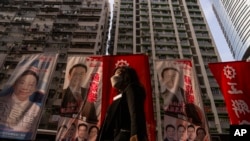Hong Kong will hold a "patriots only" district council election Sunday, with 399 candidates running for 88 directly elected seats. The city’s authorities will appoint the rest of the 382 district councilors.
The election follows a historic landslide victory for the pro-democracy camp in the 2019 district council election, which saw more than 70% of the voters showing up to vote.
It also comes after the Hong Kong government overhauled the election process in July, reducing the number of directly elected seats to just 20% and implementing a strict vetting mechanism to ensure that all candidates fit the criteria of "patriots."
To encourage voters to come out and vote, Hong Kong authorities have rolled out a series of measures, such as organizing free concerts and fun fairs to "create a happy atmosphere," and encouraging nursing homes to help senior citizens cast ballots by offering each elderly community center a one-off allowance worth around $2,500.
Hong Kong’s Cathay Pacific Airways is also offering discounted airfares from China to Hong Kong, hoping to help encourage more Hong Kongers working on the mainland to return to the city and vote. Despite the government’s wide-ranging efforts, some analysts say voter turnout could be low.
"When Hong Kong held the Legislative Council election in 2021, which plays a more important role in Hong Kong than the district council, the Hong Kong government added voting stations along the border with China, but the voter turnout rate was only 30%," Chung Kim-wah, an expert on Hong Kong politics in the U.K., told VOA by phone.
He added that while Hong Kong authorities have done more to mobilize voters for the district council election, voter turnout would likely be lower than 30%.
"Many Hong Kongers I know are not interested in the district council election because they know what real elections look like based on experiences before 2020," Chung added.
Some Hong Kongers say they have no plan to vote in an election that is completely controlled by the government.
"If I voted in the election, it would seem like I support the government’s efforts to tighten control over Hong Kong’s civil society," Annie Leung, a 35-year-old accountant, told VOA by phone.
Others view the election as a way for the government to reward their loyalists. "The election is just a slogan to reinforce the government’s control while distributing benefits to the so-called “patriots”," Esther Wong, a 39-year-old artist, told VOA in a written response.
Apart from efforts to mobilize voters, the Hong Kong government has also been cracking down on election critics. Earlier this week, Hong Kong’s anti-corruption watchdog charged a 38-year-old programmer with inciting others to not vote in the election. They also applied for an arrest warrant for a 45-year-old Hong Kong political commentator who know lives in Germany for similar offenses.
Chung said the reluctance to vote reflects a lack of faith in the city’s political system.
"When Hong Kong people think the political system can no longer represent the people, they will gradually choose to ignore anything that the government is doing," he told VOA.
Although Hong Kong Chief Executive John Lee has said the election is important as it will "facilitate communication between the people of that district and the government," some analysts and former lawmakers have characterized it as a "sham election" that contradicts universal democratic principles.
"This is not an election but a selection of district councilors controlled by the Hong Kong government," Ted Hui, a former Hong Kong lawmaker who lives in exile in Australia, told VOA by phone.
Even though Hong Kong’s top official, John Lee, defended the election rules as "open and fair," no opposition party was able to nominate a candidate and local media reports found that more than 75% of the candidates passing the vetting process are members of the committees responsible for nominating the candidates.
In the last district council election in 2019, the pro-democracy camp won more than 85% of the seats.Some experts said authorities efforts to overhaul the election process shows their determination to block opposition parties.
"The Hong Kong government wants to have complete control of the electoral results and ensure that no opposition voices can get into the political arena," Maggie Shum, a political scientist at Behrend College at Pennsylvania State University, told VOA by phone.
Shum said the "patriots only" requirement for candidates and other restrictive measures that Hong Kong’s pro-Beijing government has implemented since 2020 are similar to the Chinese government’s playbook.
"The Chinese government and the Hong Kong government are playing the long game of turning the city into a more Chinese city," she said.
In her view, while the trend suggests Hong Kong is "going down a dark path," with the authorities becoming more repressive, Shum thinks it remains to be seen how the process will affect Hong Kongers and the city in the long run.





